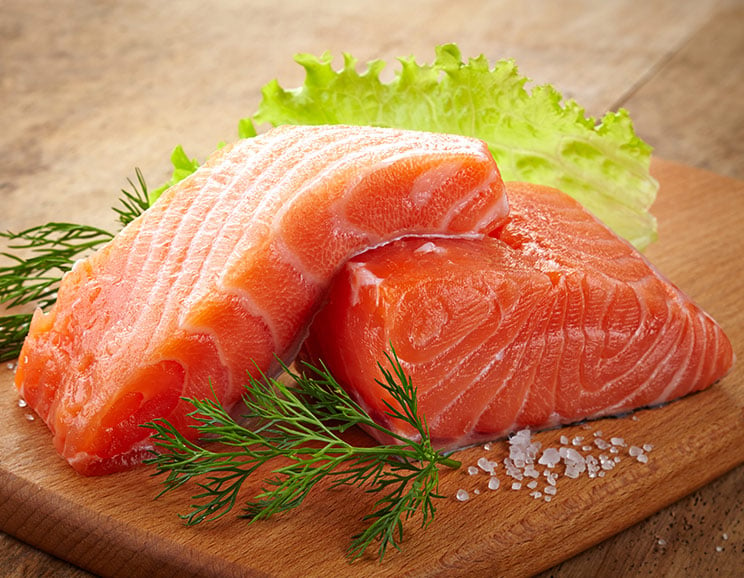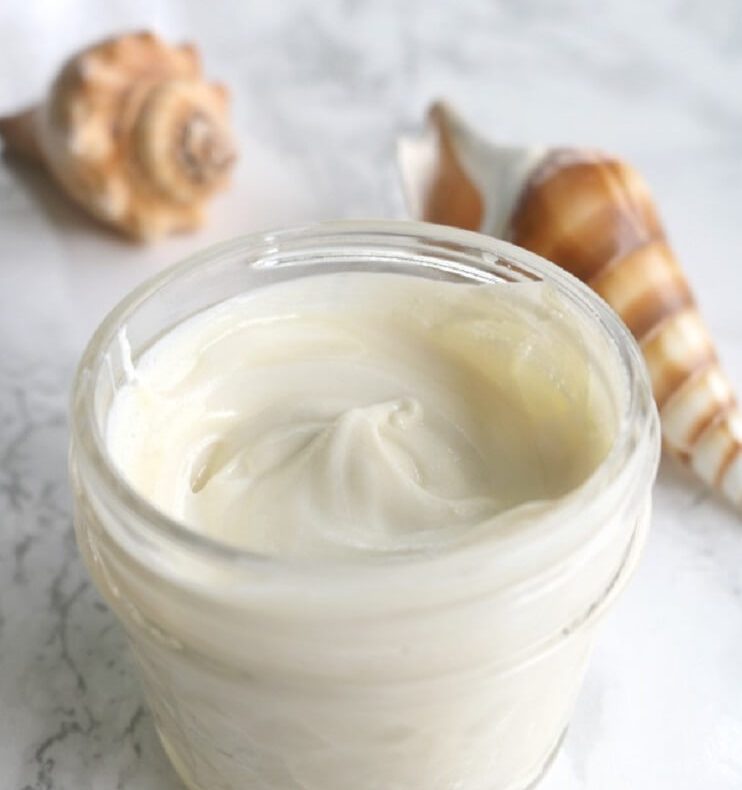Leptin, also known as the “satiety hormone”, is responsible for keeping your weight stable. Here’s what you need to know if you’re leptin resistant.
When leptin is working right, you lose your appetite after you eat enough to meet your body’s energy needs.
But what about when leptin isn’t functioning properly? This is the unfortunate reality for millions of people out there, and sorting it out just might be the key to unlocking your weight loss and health struggles.
In need of a sugar detox?
Click here to get your FREE Sugar Detox Guide + Sugar-Free Recipes!
What Is Leptin?

Leptin is a hormone that wasn’t discovered until 1994. (1) Researchers are just now beginning to understand how crucial it is for maintaining an ideal weight and overall health.
This hormone is produced in the fat cells in your body, and serves two major purposes. It sends signals to your brain that you’re hungry or full, and it regulates your body’s energy expenditure. The more fat cells you have, the greater the amount of leptin in your body. (2)
Leptin signals your brain to stop eating once you’ve replenished your energy stores. But that only happens when the signaling mechanism is working right.
Almost everyone has the leptin they need to function. But things break down when their brains stop receiving leptin’s signals and responding to them accordingly. This is a condition called leptin resistance. Your brain struggles to recognize (and respond to) the hormone signaling. So you end up feeling hungry all the time – even when you eat more than enough food to fuel your body.
Your body is full, but your brain tells you that you’re starving. This leads to all kinds of nasty health problems. Leptin resistance has been linked to obesity, bone problems, and even an increased risk of heart disease. (3, 4)
How Can You Tell If You’re Leptin Resistant?

Millions of people are leptin resistant, and many don’t even know it.
The typical modern diet is a huge factor. Eating a lot of sugars, grains, and processed foods causes your fat cells to flood your body with leptin. Do it often enough, and the body adapts by becoming resistant to leptin.
This process works similarly to how people become resistant to insulin. It leaves you feeling sick, tired, and hungry all the time – even when you’re eating way more than your body needs. (5)
The good news is that you can take action to restore leptin sensitivity and turn your health around. Here are the top five signs you might be leptin resistant.
You’re Overweight (or Underweight)
The easiest way to find out if you’re leptin resistant? Hop on a scale. If you’re 15 pounds overweight or more – and a good portion of that fat is accumulated on your belly – you’re almost certainly leptin resistant. (6)
Extra weight is often a byproduct of your brain not being able to respond to leptin properly. If you’re struggling to lose weight, leptin resistance could be to blame. You don’t have to be overweight to be struggling with leptin resistance. If you’re more than 10 or 15 pounds underweight, your body’s response to leptin also might be out of whack.
Bottom line: if your weight falls outside a healthy range – and you’ve been trying to change it unsuccessfully – you’re probably leptin resistant.
You Have Food Cravings Constantly
If you’re always on the lookout for another snack to tide you over until meal time, this could be another indicator. Out of control food cravings (especially cravings for junk food) are common symptoms of leptin resistance.
Try spacing out your meals so there are at least four hours between them, and don’t let yourself snack. If this is difficult for you, there’s a good chance you’re leptin resistant.
You Aren’t Eating Nearly Enough
If you’re trying to clean up your diet and lose weight fast, it’s tempting to drastically cut your caloric intake. However, any time of extreme calorie restriction can backfire, causing your body to adapt by becoming even more resistant to leptin.
This is because after a sudden caloric change, your body does everything in its power to hang on to stored fat. This happens to a lot of people unintentionally when they switch to a Paleo diet. Many are great about cutting out sugars and processed foods, but they struggle to replace enough of those calories with better alternatives.
You might be drastically undershooting the calories it takes to maintain your current weight (or lose weight at a sustainable level).
Bottom line: drastically reducing calories makes it even harder to lose extra weight.
You’re Stressed Out and Sleep Deprived
It seems like everyone’s frazzled and in a rush these days. While people justify a fast-paced lifestyle in the name of productivity, the truth is that stress and sleep deprivation can have a huge impact on your weight and health.
A combination of high stress and not enough sleep spikes your cortisol, or stress hormone, levels. More cortisol leads to more stress and less sleep, resulting in a vicious cycle ends the same way every time: poor health.
If you aren’t taking action to manage your stress or get at least seven to eight hours of sleep each night, you’re doing yourself a disservice. High cortisol levels lead to leptin resistance, and when left unchecked, can cause obesity, inflammation, and an increased risk of heart disease. (7)
You Follow a Typical Modern Diet
The typical modern diet is atrocious. It’s packed with sugar, refined carbohydrates, and too many nasty preservatives and chemicals to name. Eating these kinds of foods constantly will ruin your body’s natural leptin response.
Sodas, candy bars, and other sugary foods flood your body with a temporary burst of energy, but it doesn’t take your body long to process these nutritionally empty foods. You can eat them and find yourself hungry again an hour or two later. These foods send your leptin on a rollercoaster ride. Surges of leptin force your body to adapt by becoming resistant to the hormone.
Your brain ends up thinking you’re hungry all the time, even though you’re packing in food!
5 Steps to Restoring Leptin Sensitivity

If one or more of the symptoms above fits your current situation, there’s a good chance you’re leptin resistant.
To get your appetite and energy levels back on track and reverse leptin resistance, it’s crucial to start making smarter choices in your diet and lifestyle. Start with these basics.
1. Cut out Grains, Sugars & Processed Foods
Replace these foods with more “slow burn” energy found in nutrient-dense, whole foods will help you avoid nasty leptin spikes that end in leptin resistance. Instead, focus on organic vegetables, grass-fed meats, and healthy fats like avocados.
2. Eat More Omega-3 Fatty Acids
A balanced ratio of omega-3 and omega-6 fatty acids is essential for health. Unfortunately, most of us are consuming way too many omega-6s from vegetable oils, processed foods, and factory-farmed meats. You can increase your omega-3 fatty acid intake by eating more fish, like this pan-seared salmon in a garlicky ghee sauce. Or, you can take a high-quality fish oil supplement every day.
3. Avoid Snacking
It’s okay to grab a piece of fruit or a handful of nuts every now and then to make a rumbling stomach go away. When you’re fighting leptin resistance, though, it’s important to try to limit snacking as much as possible.
Sticking to a few meals a day – instead of constant streams of food – will stabilize your leptin levels and avoid constant spikes. That makes it easier for your body to respond to leptin like it should.
4. Exercise
We all know how important it is to get your heart rate up. Walking, jogging, playing tennis and other aerobic exercises are all great, but you may always want to consider adding a bit of resistance training to your routine. Lifting weights can help increase leptin sensitivity, which makes it easier for your body to tell your brain when it’s full and help you lose weight. (8) If the idea of joining a gym gives you anxiety, start with this light dumbbell workout you can do right at home!
5. Manage Stress and Get More Sleep
It’s important to get your stress levels under control if you’re going to beat your leptin resistance. Make it a priority to get plenty of sleep each night, and try getting your cortisol levels in check by practicing yoga, meditation, or other calming exercises you can add to your daily routine.
The Bottom Line
If you’re struggling to control your weight and stay healthy, leptin resistance could be the culprit. Make a few simple diet and lifestyle adjustments to lay the foundation to restore leptin sensitivity, control your weight, and improve your health. No prescription necessary!
Sugar can be hard to quit, but it’s important to do if it’s messing with your leptin signaling. For a little extra help, see these 8 Signs You’re Addicted to Sugar and How to Overcome It.




 20 Easy Paleo Crock Pot Recipes
20 Easy Paleo Crock Pot Recipes







Show Comments